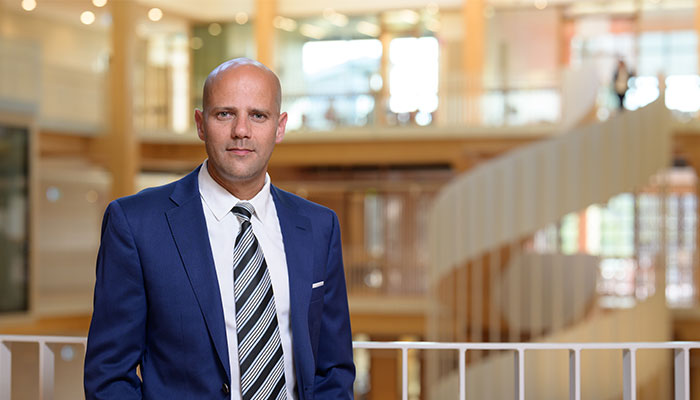Teacher: Dr Doron Goldbarsht, Associate Professor, Macquarie Law School. Director, Financial Integrity Hub and Academic Head of Graduate Certificate in Financial Integrity Law (GCFIL).
Groundwork: Doron holds a Bachelor of Laws and Master of Laws from the Hebrew University of Jerusalem and a PhD from the University of New South Wales.
Gold stars: Highly Commended Finalist for the Vice‑Chancellor’s Award for Learning Innovation.
How Doron’s students describe him: Passionate, engaged, and probably a bit demanding - but in a good way. He likes to push them to think critically and always dig deeper.

What Doron says:
I currently teach several units focusing on financial crime for both undergraduate and Juris Doctor students. My teaching emphasises the legal, regulatory and practical aspects of financial crime prevention, providing students with a thorough understanding of global and Australian Anti-Money Laundering and Counter-Terrorism Financing (AML/CTF) frameworks. I also supervise PACE students, Honours, Master of Research, and PhD students who are conducting cutting-edge research on these topics.
The new Graduate Certificate in Financial Integrity Law (GCFIL) is designed to address a gap in the market. Especially in light of the recent introduction of the Anti-Money Laundering and Counter-Terrorism Financing Amendment Bill 2024 by the Attorney-General. This bill represents a significant advancement in our efforts to combat financially motivated crime, aiming to strengthen Australia’s AML/CTF framework. If passed, we could see the number of regulated entities increase from 17,000 to approximately 120,000, which means that professionals like lawyers, accountants, and real estate agents will need to familiarise themselves with the law, alongside those already in the banking and gambling industries. While there are a few certification options available, the GCFIL stands out because its curriculum is developed by both academic and industry experts and is specifically tailored to the Australian context.
My approach to teaching is grounded in the belief that students should not just absorb information but critically engage with it. This is particularly important in a complex and evolving field like financial crime. I prioritise creating an interactive, discussion-driven environment where students are encouraged to question assumptions, debate real-world issues, and apply theoretical concepts to practical scenarios.
What I love most about teaching is the opportunity to inspire and empower the next generation of thinkers and professionals. Law is a powerful tool that shapes our society, and helping students grasp its complexities, as well as its real-world applications, is deeply rewarding. It’s amazing to witness the transformation as students not only gain knowledge but also develop critical thinking and problem-solving skills that will serve them in their careers and beyond. The field of law is dynamic and multifaceted and being able to introduce that to students is both a privilege and a passion.
Many students face the pressure of balancing academic demands with personal commitments, which can lead to stress and burnout. As teachers, we can help by fostering a supportive environment where students feel comfortable discussing their challenges. Encouraging open communication and understanding can help students feel less isolated in their struggles, allowing them to achieve their maximum potential without compromising the standards and quality we expect as educators.
One piece of advice I always give students is to embrace the journey of learning, even when it feels challenging. Law can be complex and daunting, but it's also incredibly rewarding. I encourage my students to stay curious and ask questions, to see every obstacle as an opportunity. It’s not just about getting the grades; it’s about developing a critical mindset and understanding the world around us. And most importantly, having fun along the way - because if you can’t enjoy the process, what’s the point?
The perfect student is … one who embodies a combination of curiosity, diligence and resilience. They actively engage in discussions, challenging themselves and their peers to think critically and explore diverse perspectives.
Discover more about the Graduate Certificate of Financial Integrity Law



